
Bulltetin célinien n°403
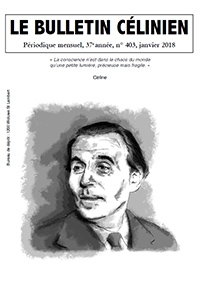 Sommaire :
Sommaire :
Une réédition sous surveillance
Klarsfeld réclame l’interdiction des pamphlets
Un poème d’Auguste Destouches
Le docteur Clément Camus (2e partie)
Théâtre : La Ballade du soldat Bardamu.
En poursuivant votre navigation sur ce site, vous acceptez l'utilisation de cookies. Ces derniers assurent le bon fonctionnement de nos services. En savoir plus.

Bulltetin célinien n°403
 Sommaire :
Sommaire :
Une réédition sous surveillance
Klarsfeld réclame l’interdiction des pamphlets
Un poème d’Auguste Destouches
Le docteur Clément Camus (2e partie)
Théâtre : La Ballade du soldat Bardamu.
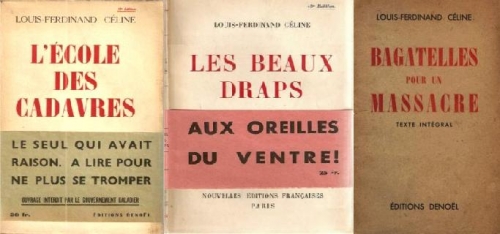
Le Bulletin célinien a été fondé en 1981 par Marc Laudelout (n°0). D’abord trimestriel (1982, n° 1 à 4), il devient mensuel à partir de l’année suivante. Plus de 400 numéros ont paru depuis. Il s’agit du seul périodique mensuel consacré à un écrivain.
Écrire à Marc Laudelout
139 rue Saint-Lambert
B.P. 77
1200 Bruxelles
Belgique
bulletinlfc@gmail.com
16:59 Publié dans Littérature, Revue | Lien permanent | Commentaires (0) | Tags : littérature, littérature française, louis-ferdinand céline, céline, france, lettres, lettres françaises, pamphlets de céline, marc laudelout |  |
|  del.icio.us |
del.icio.us |  |
|  Digg |
Digg | ![]() Facebook
Facebook
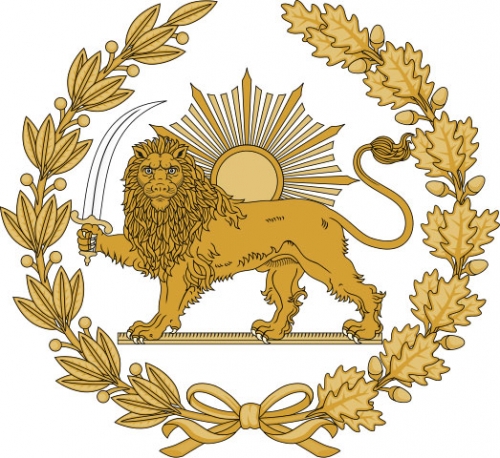
No one in the mainstream media seems to have noticed that the uprising in Iran took place six months after the most well-established Iranian opposition groups were unified for the first time in 38 years of theocratic tyranny. On August 11, 2017 in Los Angeles, the Constitutionalist Party, the Pan-Iranist Party, and the National Front were brought together under the cultural umbrella of the Iranian Renaissance to form the Jebheyé Irângarâyân or Iranian United Front (literally, the “Iranist Front”).
For about a year now, a faction within the so-called “hardliners” of the Islamic Republic has been considering embracing the idea of an Iranian Renaissance in order to salvage some of the core structures of the Islamic Republic that protect Iran’s banking system from globalist control and secure Iran's territorial integrity in the face of foreign-backed separatist agitators. This faction is centered around Esfandiar Rahim Mashaei, who briefly served as Mahmoud Ahmadinejad’s Vice President and was unsuccessfully backed by Ahmadinejad to run against Rouhani (because the Guardian Council deemed Mashaei a “deviationist” for his nationalism). Mashaei’s circle has been reading Renaissance texts such as The Political Thought of Aryan Imperium, written by Shahin Nezhad, the spokesman of the Iranian Renaissance (and a Mashadi), who delivered a talk at The London Forum last February. Since this group of hardliners are a part of the regime itself, they were able to secure permits for demonstrations against worsening economic conditions and corruption. Ahmadinejad gave a speech threatening the regime's corrupt establishment shortly before the protests began, and he has since been arrested by the Islamic Republic for provoking unrest. The slogans of the Ahmadinejad-associated protests condemned the so-called “reformist” Rouhani administration for its broken promise that Iran’s concessions in the nuclear deal would raise living standards.
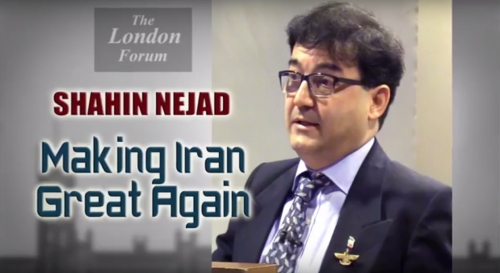
At the same time that these legal demonstrations were organized in the city of Mashad (the city of Imam Reza), the Iranian Renaissance planned a celebration for Ferdowsi’s birthday. The event was originally scheduled for the 27th of Âzar (his actual birthday), but then rescheduled for the 2nd of Dây (the date he gives for his birth, not adjusted to changes in the calendar system), or December 23, 2017. The tomb of the author of the Persian national epic, the Shâhnâmeh, is in Tous, just outside of Mashad. The idea was to replicate our Cyrus Day event, when hundreds of thousands gathered at the tomb of Cyrus the Great on October 29, 2016. Once busloads of ultra-nationalists arrived at the tomb, they were informed that their rally permit was revoked. These angry ultra-nationalists were diverted to Mashad where they encountered the legal hardliner demonstrations, and joined them, shifting the slogans in a nationalist direction. Then they went back home to the smaller cities and towns where the Renaissance has its largest following, rather than in more Westernized major metropolitan areas. The rest is history.
The protests that we have been seeing in Iran since late December of 2017 are fundamentally different from the Green Movement of 2009. This can be seen from the type of slogans being chanted by demonstrators. They are not in favor of democracy or demanding so-called ‘free elections.’ No one is asking “where is my vote?” and not so much as a green handkerchief can be seen on the streets during this uprising. Here is a breakdown of some of the slogans that have become definitive of this revolt.
“We are Aryans, we don’t worship Arabs!”
Iran is shorthand for Irânshahr, the Middle Persian form of Aryânâ Khashatrâ or “Aryan Imperium.” Persians never referred to Iran as “Persia” or the “Persian Empire.” What we are seeing on the streets in Iran is the spearhead of a renaissance of the Aryan heritage of Iran after 1,400 years of genocidal Arab, Turkic, and Mongol colonization. Those who are concerned that Iran’s uprising will lead to the kind of change we saw during the so-called “Arab Spring” are clueless regarding the chasm that divides the Arabs and other Muslim societies from Iranians. The #AryanSpring in Iran is radically pre- and post-Islamic, if not anti-Islamic.
“Islam and the Quran, we sacrifice them both to Iran!”
Protesters who are chanting slogans such as this are not simply opposing the 39-year old Islamic Republic. They are burning down mosques, and setting fire to the religious schools that train Mullahs (i.e. clergy) and produce the regime’s reigning Ayatollahs. People are rejecting Islam as such in favor a renaissance of pre-Islamic Persian values like the reverence for wisdom, industriousness, chivalry, tolerance, and humanitarianism.
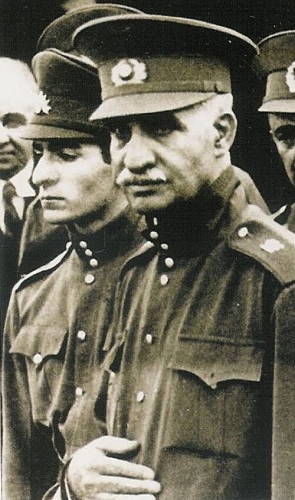 “Whether by cannons, guns, or tanks – the clergy have to go!”
“Whether by cannons, guns, or tanks – the clergy have to go!”
Contrary to the peaceful nature of the upper class 2009 protest movement, which was aimed at mobilizing the international community to impose allegedly ‘free elections’ on Iran with a pre-determined neo-liberal outcome, this working class uprising is forceful. People in the streets are not demanding a chaotic ‘democratic’ revolution, one that would decimate the nation’s industries and threaten its territorial integrity. Rather, they are inviting a military coup and removal of the Ayatollahs under martial law conditions.
“Reza Shah, may your soul rejoice!”
This is probably the most popular slogan of the current uprising, and further substantiates that the will of protesters is a transition out of the Islamic Republic under martial law. Reza Shah Pahlavi (d. 1944) was an authoritarian ultra-nationalist who came to power in a military coup. He is the one who, in 1935, requested that the world call “Iran” by the same name that the Persians have called it for 3,000 years. Reza Shah was removed by the Allied powers when they invaded and occupied Iran from 1941–1946, because although Iran was officially neutral, Reza Shah ideologically leaned toward the Axis.
So it is safe to say that what is going on inside of Iran is not a “color revolution.” In point of fact, the Mossad was taken completely by surprise, and the Trump administration had not yet even formulated, let alone implemented, a cohesive plan for how to effect regime change in Iran. We preempted them. That having been said, there is a very great danger that this movement will be co-opted.
Reza Shah, Not Reza Pahlavi
Slogans of “Reza Shah, may your soul rejoice!” should not be conflated with support for Crown Prince Reza Pahlavi, even if the latter’s supporters inside of Iran are attempting to conflate the two. The Crown Prince has repeatedly and emphatically rejected the legacy of his father and his even more authoritarian and ultra-nationalist grandfather. He is an advocate of liberal democracy, neo-liberal economics, and a kind of ‘human rights’ that entails federalism on an ethnic basis and the disestablishment of the Persian language (which we have not once heard come out of the mouth of his daughter and heir). In the summer of 2016 there was a revolt against him from among the ranks of the most elite proponents of a restoration of the Persian Imperial tradition. Those of us who signed the “Last Warning” statement of August 20, 2016 were particularly vexed by his close relationship with the Arab sheikhdoms of the Persian Gulf (which he has referred to as “the Gulf” in order to placate them). At a CFR meeting in Dallas on February 25, 2016, he went so far as to belittle the genocidal Arab invasion of Iran and mock Iranian nationalists. At the same meeting, Reza Pahlavi II relinquished a future post-Islamic Iran’s right to nuclear weapons and suggested that Saudi Arabia should so deeply invest in Iran’s economy and industry that war with the Wahhabi Kingdom would become inconceivable for Iranians. The Crown Prince has also gone on record saying that if the religious beliefs of Muslims are to be disrespected under a new regime, then it would be better for the Islamic Republic to remain in power.
Based on this past history, his response to the current developments in Iran were quite predicable. After returning from a winter vacation in Europe, which allegedly prevented him from delivering a speech during the days of the most intense protests, on January 10, 2018, Reza Pahlavi granted an interview with the newscaster Alireza Nourizadeh. In this interview, Reza Pahlavi actually admits that he “did nothing” to catalyze the uprising. He is gleeful about the prospect of its being leaderless, and yet he attempts to co-opt the movement on the streets in Iran for his own purposes, or rather, for those of his foreign financiers and handlers.
Leadership
The Crown Prince rejects the need for a charismatic leader, voicing concern that such a person could become an idol who is later toppled or smashed. He says that he has always insisted that Iran’s problems must be addressed through a bureaucratic system. This is in response to the interviewer’s rhetorical question about whether the current uprising has put him in a position of greater responsibility. As his own father once remarked about him to a prominent court minister, this Crown Prince has always endeavored to shirk responsibility by any means possible.
Reza Pahlavi denies the need for a charismatic leader to shepherd Iran’s transition out of the Islamic Republic because, unlike the grandfather who is his namesake, he is not such a leader. In fact those close to him know that he has repeatedly mocked his grandfather and criticized him for being a ‘dictator’. Apparently, the Crown Prince does not recognize the difference between dictatorship and the need for sovereign authority in a state of emergency when the normal constitutional order has been suspended. It is precisely in such situations that one cannot rely on the systematic decision-making process of a bureaucracy.

The Crown Prince also fails to recognize the difference between the type of idolatry characteristic of Sultanates and the Persian Imperial concept of farré kiâni or “divine royal glory.” The latter is an inextricable element of any properly Persian monarchical system, and it is a philosophical concept that his father embraced by assuming the title Âryâmehr or “Light of the Aryans.” The farré kiâni was aesthetically symbolized by the halo or aura around the head, a convention that entered both European and Buddhist art via Iranian influence on Roman Mithraism and the Iranian development of Mahayana Buddhism. Reza Pahlavi actually rejects the idea of farré kiâni out of deep resentment over the fact that he lacks it. Protesters on the streets are, however, clearly looking for someone with this quality.
Reza Pahlavi says, “leadership (rahbari) is not dependent on one person. We each have our own roles. A workers syndicate leader has to provide leadership (rahbari) to exactly the same extent as a social activist inside the country and a student leader and so forth.” This shows his fundamental failure to understand the concept of rahbari or shahriyâri, i.e. sovereignty, in the framework of Iranian political thought. This becomes clearer in the context of his remarks concerning democratization of Iran.
Democracy
The Crown Prince identifies the establishment of a “true democracy” as the goal of the uprising against the Islamic Republic. He further defines this as the determination of Iran’s form of government, as well as all of the policies of this government, by means of “the ballot box” and according to “the will of the majority.” Interestingly, in rejecting the restoration of monarchy as a foregone conclusion, he says “I don’t know what form of government the majority of the people of Iran will choose in the future election that establishes a secular democratic parliamentary regime.” These are very telling words. They reveal that for Reza Pahlavi “a secular democratic parliamentary regime” is non-negotiable and while various ‘monarchist’ and republican parties may contend over the specific shape that it takes, the basic ideological parameters of this coming regime are predetermined.
What if the single largest segment of the population with a coherent will (what Rousseau called a volonté générale, which need not amount to 51%), prefer a regime that is not democratic or secular in the sense that Reza Pahlavi means? After all, the Islamic Republic came to power in a democratic election wherein 98.2% of the population voted for a regime that the Crown Prince himself now describes as “an occupation regime”. Perhaps Reza Pahlavi can identify what foreign power 98.2% of Iranians were acting as a fifth column for when they democratically elected it? If foreign manipulation did take place on such a scale (and perhaps it did), then why would the Crown Prince assume that democratic elections held amidst a chaotic revolution now would not be manipulated in the same way? Including, and especially, by the foreign interests who want to install him.
It is significant that he uses this phrase, “occupation regime”, to describe the Islamic Republic at a point in this interview when he is praising France as a model democracy. Since 1789 France has been through five republics, with each of the four preceding the present one being brought to an end by either a bloody revolution or a devastating war! Meanwhile, the “democratic” policies of the present French Republic have turned large parts of Paris, Marseilles, and other major metropolitan areas into Muslim slums and Sharia-law enforced no-go zones. Within a generation, there may be a Muslim majority in metropolitan France.
More fundamental than all of these criticisms is the fact that Iranian civilization is fundamentally anti-democratic and has been so since Darius and Xerxes fought with Athens over the control of Greek city states, many of which were pro-Persian. The core concept of Iranian political thought is Shahrivar (a contraction of the Avestan Khashatrâ Vairyâ), which means a utopian aristocracy wherein those who are most qualified to make decisions regarding certain areas of state policy are the ones making them, rather than the ignorant masses. This system avoids the injustice of treating those who are unequal as if they are equals. As Darius the Great states in the rock carving of Behistun, "Neither did I allow the strong to oppress the weak, nor did I allow the weak to tyrannize over the strong. I stood for what is Just." This conception of good governance guards against the manipulation of the masses by oligarchs who hide behind the façade of a democracy. Heraclitus, Pythagoras, and Plato all essentially accepted the superiority of this Persian form of government over the democracy exemplified by Athens. This ideal was resurrected in the West during the Italian Renaissance and its modern European representatives are thinkers such as Friedrich Nietzsche, Julius Evola, Carl Schmitt, and Martin Heidegger.
Unlike Greek democracy, the Persian Imperial tradition, which Reza Shah Pahlavi resurrected and Crown Prince Reza Pahlavi disowns, is one that outlawed slavery and insisted on charitably providing economic welfare to all workers (Daheshmandi) with a view to promoting industrious development and the beautification of the world (Abâdsâzié Gitiârâ). Such ideals of statecraft were superficially Islamized by Medieval Iranian thinkers like Shahab al-Din Suhrawardi and Al-Farabi, whose treatises in turn influenced Ayatollah Khomeini and some of the other theoreticians of the Islamic Republic. In other words, there are certain anti-democratic formal structures of the Islamic Republic that are thoroughly Iranian. Iranians can de-Islamize and reclaim these rather than adopting a system of government that is problematic even in the West.
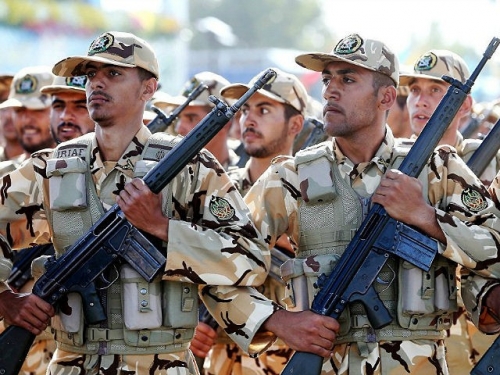
Human Rights and Secularism
Reza Pahlavi claims that the next constitution of Iran should be based on the 1948 United Nations’ Universal Declaration of Human Rights (UDHR), and he places a special emphasis on the freedom of religion (Article 18) while insisting on a “secular” regime. The Crown Prince makes it emphatically clear that by “secular” he does not mean anti-Islamic. On the contrary, he is very concerned with protecting Islam and the rights of Muslims to profess and practice their religion in tomorrow’s Iran.
The UDHR protects freedom of religion unconditionally, and it declares that popular sovereignty is the basis of the legal authority of governments. The drafters formulated these rights in an unqualified manner that renders the Declaration incoherent and self-vitiating, because it inadvertently allows the ‘moral majority’ of a religious democracy to deny dissenting minorities the very human rights that are protected by the Declaration. Certain of the drafters of the declaration were aware of this possibility. If one compares the law of the Quran to the Universal Declaration of Human Rights it becomes clear that Islam is not compatible with the qualified liberal democracy that some of the UDHR drafters had in mind when writing Article 21, but is compatible with the original Greek conception of Democracy, as well as the kind of Democracy advocated by Jean-Jacques Rousseau.
The establishment of the Islamic Republic of Iran in the popular revolution of 1979 is an example of a democracy that, once established, renounced its nation’s commitment to make a sincere effort to protect universal human rights under the UN Charter. There is a fundamentally false presumption underlying the drafting of Article 18’s unqualified right to freedom of religion, namely that the state can be “neutral” with respect to any and all religions. This is the same delusion that Crown Prince Reza Pahlavi is laboring under. It is nonsensical to tolerate an irrationally and inherently intolerant religion, and it is impolitic to do so when your nation is presented with a historic opportunity for a cultural revolution that could move it beyond 1,400 years of Islamic colonization at the hands of Arabs, Turks, and Mongols, on the basis of a renaissance of pre-Islamic Persian principles and ideals.
Humanism is one of these ideals, and it is often confused with the internally contradictory modern Western formulation of “human rights.” Cyrus the Great was not the author of ‘the first declaration of human rights,’ as Westernized Iranians like to refer to the Cyrus Cylinder. Cyrus the Great was an autocratic militarist whose conquests established the first true empire in human history that encompassed and integrated numerous formerly independent kingdoms. It is true that he was able to do this because, unlike previous tyrannical rulers, he was also a humanitarian. His humanitarian character and the cosmopolitan humanism of his Achaemenid successors is based on an ancient Iranian concept called Vohuman, which is the oldest Indo-European instance of the word “human.” According to Zarathustra (Zoroaster), one is a human being to the extent that one has cultivated one’s mind and thereby raised oneself above what one shares in common with animals. This sense was retained when Mithraism acted as a conduit to bring this idea from Iran to Rome, where it was revived as the ideal of humanitas in the Italian Renaissance. The West implicitly recognizes this in the designation of the liberal arts as “humanities” or the means whereby one becomes a human being. That is what Saadi of Shiraz meant in the famous poem that Barack Obama was so fond of misquoting, and that is stitched into a Persian carpet at the United Nations: “The children of Adam are all limbs of one another, should one be in distress the others unmoved cannot remain; should you be indifferent to human pain, a son of Adam may your name not remain!” This is not an endorsement of “human rights.” On the contrary, the idea is that many people are not deserving of being considered “human.”
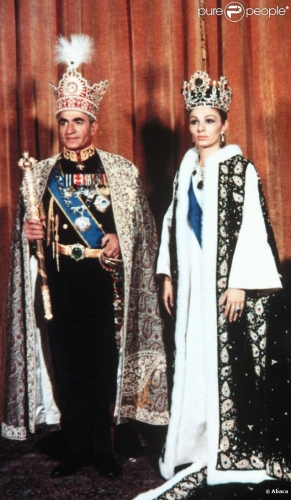 What is particularly alarming about Reza Pahlavi’s discourse of human rights and secularism, especially considering that he is funded by Saudi Arabia, is that he wants Sunnis in outlying provinces such as Kurdistan and Baluchistan to be able to build mosques and religious schools that reflect their beliefs. At a time when the majority of Shiite Iranians are burning down mosques and seminaries, do we really want Wahhabi-funded madrassas in Iran? Reza Pahlavi is utterly ignorant of his nation’s history when he claims, in this interview as in many others that he has given, that the Shiite-Sunni conflict does not precede the Islamic Republic’s allegedly divisive state ideology and foreign policy. When the Ismaili Assassins and Shah Ismail Safavi took up the banner of Shiism, it was to exploit this sectarian division in order protect Iran from being swallowed by the Arabian and Turkic Caliphates. Otherwise, Iran today might look a lot more like Persian-speaking Afghanistan. Iranian society has evolved beyond the need for cloaking Iranian ideas and values in a Shiite garb. Nevertheless, it is dishonest to deny the historic relationship between Shiism and the struggle to maintain Iranian identity in the face of the Sunni Muslim orthodoxy of the various Caliphates, including the present Islamic State to Iran’s immediate West and Al-Qaeda or the Taliban on Iran’s eastern border.
What is particularly alarming about Reza Pahlavi’s discourse of human rights and secularism, especially considering that he is funded by Saudi Arabia, is that he wants Sunnis in outlying provinces such as Kurdistan and Baluchistan to be able to build mosques and religious schools that reflect their beliefs. At a time when the majority of Shiite Iranians are burning down mosques and seminaries, do we really want Wahhabi-funded madrassas in Iran? Reza Pahlavi is utterly ignorant of his nation’s history when he claims, in this interview as in many others that he has given, that the Shiite-Sunni conflict does not precede the Islamic Republic’s allegedly divisive state ideology and foreign policy. When the Ismaili Assassins and Shah Ismail Safavi took up the banner of Shiism, it was to exploit this sectarian division in order protect Iran from being swallowed by the Arabian and Turkic Caliphates. Otherwise, Iran today might look a lot more like Persian-speaking Afghanistan. Iranian society has evolved beyond the need for cloaking Iranian ideas and values in a Shiite garb. Nevertheless, it is dishonest to deny the historic relationship between Shiism and the struggle to maintain Iranian identity in the face of the Sunni Muslim orthodoxy of the various Caliphates, including the present Islamic State to Iran’s immediate West and Al-Qaeda or the Taliban on Iran’s eastern border.
Liberalism
According to the Crown Prince, “Liberalism” was the uncompleted goal of the Persian Constitutional Revolution of 1905-1911 and the current revolt against the Islamic Republic represents the completion of the final stage of the project initiated by the constitutionalist revolutionaries. How interesting that although he rejects Iranian sacred ideals such as farré kiâni and insists that the next regime of Iran should be radically neutral with respect to every religion, Reza Pahlavi refers to the attainment of “complete liberalism” in Iran as “this sacred goal.” He does so while asserting that Iran’s new constitution should not be based on any particular ideology: “Equality before the law will have been established when no ideology is superior to any other and all ideologies are free. I see this exemplified around the world, in the freest and most progressive countries.” Does he think that Liberalism is not an ideology?
Of course it is. Liberals just cheat themselves out of an honest fight by pretending that it isn't. Liberalism is an ideology that originated in modern Europe and one that has been embraced by a particular segment of Western society, a small minority of extremely Westernized Iranians living abroad, and perhaps also an even smaller urban elite of nihilistic materialists in wealthy districts of Tehran and other big cities. It is certainly not the ideology of the people protesting since December 28, 2017.
Furthermore, Liberalism is an incoherent ideology insofar as it attempts to synthesize itself with Democracy. “Liberal Democracy” becomes a contradiction in terms as soon as the will of a majority in any country (or perhaps in a future global democracy) turns out to be illiberal. This may take the form of the electorate embracing some form of religious orthodoxy as the basis of public policy, as in the so-called “Arab Spring”, or democratic elections that empower more secular but anti-liberal forces, as in the example of Italian Fascism and German National Socialism. As Carl Schmitt understood well in his critique of John Stuart Mill, liberals like Reza Pahlavi make the mistake of confusing a political regime’s decision-making with a gentlemen’s debating society. Every political order is at least implicitly based on a certain ideology. More than that, sovereign decision needs to be grounded in an ethos or moral character that is more fundamental than the written constitution of a nation.
“Liberalism” is an uprooted way to conceive of the values of a particular culture or civilization, values which Iranians actually may share with certain of their European cousins, on the basis of a common Aryan heritage of free-spirited chivalry and broad-minded tolerance. However, these values are nothing like universal to humanity and in Iran, in particular, they have been under a 14 century-long assault by brutal Muslim colonizers of the kind that are now targeting the West as well. It is the most liberal social atmosphere in Persian history, the Mazdakite Revolution of the late Sassanian period, that opened the way for the Islamic Conquest of Iran. The liberalizing reforms enacted by the Shah in the late 1970s, under pressure from President Carter and other Western leaders, led directly to the Ayatollahs’ tyranny. Today, when Iran is flanked by two rival forms of a fundamentalist Sunni Caliphate, and also finds itself across the Persian Gulf from a Wahhabi regime that is funding and arming anti-Persian separatists in all of Iran’s most resource-rich provinces, advocating a constitutional order based on liberal ideology is tantamount to treason.
Globalist Capitalism vs. Nationalism
The final points that Reza Pahlavi makes in his January 10th interview are the most damning. He doubles down on the direct assault on Iranian nationalism, and the promotion of globalist economics, which I blasted him for during an interview with Omid Dana that exposed his February 2016 speech and Q&A session at a Council on Foreign Relations dinner in Dallas. Toward the very end of his interview he even chuckles as he mentions that he has said these things before “at considerable cost.” He is talking about the damage that Omid and I did to him with this interview. Unrepentant, the Crown Prince patronizingly explains that: “We have to think deeply and get out of these blind nationalist games that always pit Arabs against Aryans and look at things in a way that is a little more sophisticated and realistic.” He goes on to point out that European nations that fought terrible wars with one another are now joined together in the European Union, citing France and Germany, and France and England, in particular. Based on this grotesquely false analogy, which shows his inability to even conceive of an Iranian Civilization distinct from the Arab and other Muslim cultures that misappropriated its genius, he argues that Iran should enter into a regional common market with Saudi Arabia. Each of the countries in that market, the vast majority of which would be Arab states, ought to invest in all of the others to the extent that war between them becomes impossible.
In fact, Reza Pahlavi goes so far as to suggest that Iran should agree to have an integrated military structure with Saudi Arabia that would act as a “common defense” for the entire region of the Middle East and North Africa, stretching as far as Morocco. He repeatedly emphasizes that these ideas are based on numerous conversations with big players in the United Arab Emirates, Egypt, Saudi Arabia, and “the Arab world as a whole” where, he claims, people have no animosity toward Iranians and are only opposed to the Islamic Republic. So the Crown Prince essentially wants Iran to be swallowed by the GCC or Arab League, and one is left wondering if he could really be so idiotically naive as to believe what his Arab benefactors are telling him.
“In the end it’s all about people being able to get their daily bread, right?” he asks rhetorically. “Well, then,” he says, “if that’s what it is, tell me where the majority of the capital for rebuilding our nation is going to come from? …Who has the most money in their hands? These very same countries in the region. Should we throw it at each other in the form of missiles?! Or should there be capital investment in Iran to create jobs?” In other words, Reza Pahlavi wants sheikhdoms like Saudi Arabia and the UAE to be the single largest source of capital investment for the rebuilding of Iran’s economy after the overthrow of the Islamic Republic destroys all of those industries under the control of the Islamic Revolutionary Guard Corps (IRGC). The cherry on top is what he says about the banking system of Iran, which is currently one of the very few nations in the world without a Rothschild controlled bank: “When you… institute international standards, and regulations concerning banks – Iran is crying out for this! We cannot constantly be interfering in the affairs of our neighbors.” Really? The protesters are crying out for a Rothschild bank?
Reza Pahlavi is a disgraceful antithesis of the grandfather who is his namesake. The Pahlavi dynasty died with the Crown Prince's 'suicided' brother, Shapur Ali Reza – a true patriot and a doctor of Iranian Studies. This leaves us asking, “Who is the next Reza Shah?” Certainly not Maryam Rajavi or any commander of her Islamist-Marxist militia.
An Islamist-Marxist Terrorist Cult
The Mojaheddin-e-Khalq Organization (MEK or MKO) was the main force behind the hostage taking at the American Embassy in Tehran in 1979. They also introduced the description of America as “the Great Satan” and the slogan “Death to America!” into the Islamic Revolution in Iran. Anyone who has honestly studied the Iranian Revolution in depth knows that the hostage crisis was engineered, on the American side, by 33° freemason and CIA director George H.W. Bush. The Bushes are so close to the House of Saud that former Saudi Ambassador to the United States, Bandar bin Sultan was nicknamed “Bandar Bush.” So it should be no surprise that Saudi Prince Turki Bin-Faisal has praised the late Massoud Rajavi, leader of the Mojahhedin-e-Khalq, as a hero worthy of those memorialized in the Shâhnâmeh.
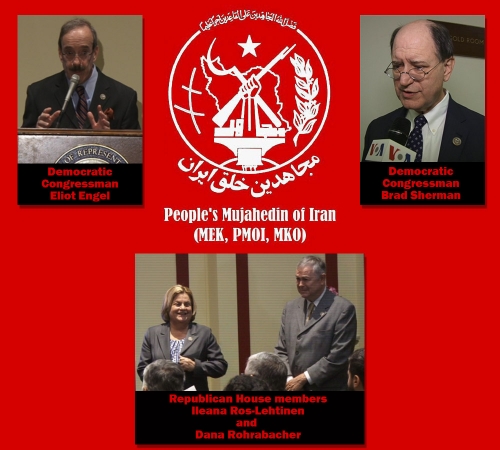
On the weekend of July 2nd 2017, in a suburb of Paris, prominent US Senators Newt Gingrich and Joe Lieberman joined Saudi Prince Turki Bin Faisal to attend an event organized by the Mojaheddin-e-Khalq. At the meeting, former Democratic senator Robert Torricelli, who has since become the group’s lawyer, described them as the “point of the spear” for regime change in Iran. Also known by the aliases People’s Mojaheddin Organization of Iran (PMOI) and National Council of Resistance of Iran (NCRI), the group was on the US State Department’s list of foreign terrorist organizations until being removed by Secretary of State Hillary Rodham Clinton in September of 2012.
The Mojaheddin most certainly belonged on that list. Aside from the fact that these guerrilla fighters were responsible for assassinating Americans in 1970s Iran, and initiating the hostage-taking at the American Embassy in Tehran after the Shah was removed from power, they are first and foremost guilty of terrorizing their own membership. The group, led by Maryam Rajavi (in the wake of her husband Massoud’s recent death), is essentially a totalitarian cult of personality that controls every aspect of the lives of followers and demands blind obedience from them. Their bizarre ideology fuses a Che Guevara or Maoist type of Marxism with an anti-clerical and therefore radically heterodox messianic Shiite Islam. Their political leadership and militia commanders include red headscarf wearing women, and yet men and women are even more strictly segregated in Mojaheddin facilities and encampments than they are under the sharia law of the Islamic Republic. Members of the group are even forced to divorce their spouses and pledge all of their love to their Leader. When Massoud was still alive, it is rumored that he used to sleep with other members’ former wives as a test of loyalty. Also consistent with what is observed in many cults is the fact that disobedience from members, of any age, meets with physical torture, solitary confinement, and brainwashing tactics.
The group has virtually no following inside of Iran. After they helped to bring the provisional government of the Islamic Republic to power, Ayatollah Khomeini turned on them in 1980 and they responded by siding with Saddam Hussein during his 8-year, Western-backed war of aggression against the Iranian people. They defected to Iraqi territory taking some tank divisions and helicopters with them. Consequently, the Mojaheddin are considered traitors by almost everyone in Iran. It does not help that, during the war, the MEK agreed to govern the Iraqi-occupied oil-rich province of Khuzestan for Saddam, in the event that it could be separated from the rest of Iran, or that the NCRI’s official charter and proposed constitution promises regional autonomy and the right of self-determination to Kurdish separatists who falsely deny that all Kurds are Iranians. The US-occupation of Iraq in 2003, and the subsequent increase of Iranian influence in Iraq has meant that Iraq is no longer a safe haven for them, with the very significant exception of separatist Iraqi Kurdistan. Consequently, Rajavi and her followers have relocated most of their resources to the West.
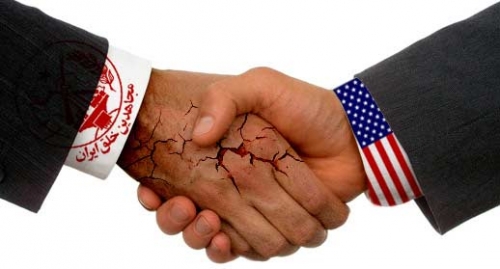
Senator Lieberman and former House Speaker Gingrich, who has been photographed bowing before the group’s leader, are not the only prominent politicians on the Mojaheddin’s payroll. The former governor of Pennsylvania, Ed Rendell, has been paid more than $150,000. Rudy Giuliani, the 9/11 mayor of New York, Republican Presidential candidate and close associate of Donald Trump, has received a $20,000 ‘honorarium’ for each of the many twenty minute speeches that he has given at MEK events over the years (including when the group was still listed as a terrorist organization). Senator “Bomb Bomb Iran” John McCain has accepted a medal from the MEK and praised them as “freedom fighters.” The list of the MEK’s bought and paid-for supporters in Washington goes on and on, including former US Ambassador to the UN, John Bolton, top brass of the US military such as Generals Wesley Clark, Peter Pace, Hugh Shelton, and Anthony Zinni, as well as three former directors of the CIA: James Woolsey, Michael Hayden, and Porter Goss.
The question is: Where does the MEK get its money? Tel Aviv and the Israel Lobby in the United States. The Mossad has trained the group’s operatives to carry out assassinations of nuclear scientists in Iran and clandestinely gather intelligence on Iranian nuclear facilities. Meanwhile, the American Israeli Public Affairs Committee (AIPAC) successfully strong-armed Hillary Clinton’s State Department to remove the Mojaheddin from its list of terrorist groups. Elie Wiesel and Alan Dershowitz are among the group’s most prominent advocates.
It has been very disturbing to see the NCRI/MEK/MKO promoted over American intelligence-backed Persian language news services during the course of the uprising. The CIA-run Voice of America Persian Service allowed Maryam Rajavi to use its capability to satellite broadcast into Iran and this reached another level with FOX News giving airtime to this Mojaheddin representative to distort the American public’s perception of this revolt against the Islamic Republic.
Bonapartist Persia
Concern over this movement being co-opted is, considering all of the above, quite reasonable, but it should leave no one with the illusion that the Islamic Republic can somehow be salvaged. Consider that 90% of the 3,700 protesters arrested in Iran are under 25 years old. No one should be fooled by the pro-regime demonstrations displayed on IRI propaganda outlets like Press TV. They are fake news. As in this case of this video from Shiraz, the Islamic Republic is transporting its supporters by bus from one city to another, staging demonstrations there, filming them, and moving on to the next city to repeat the same routine. In some cases, such as the alleged pro-regime demonstrations in Neyriz, they are simply broadcasting old footage of Qods Day gatherings on state TV. On the contrary, precisely because the situation has crossed the point of no return, it is imperative for the Iranian people to receive every encouragement to persist in their valiant struggle. Otherwise, those with the worst intentions will seize this opportunity to take up the mantle of opposition to the Ayatollahs.
President Trump should maintain his public support for the uprising in Iran. However, he should under no circumstances authorize a US military intervention in Iran. Moreover, the White House must prevent the governments of Israel and Saudi Arabia from manipulating the situation in Iran with their support for ethnic separatists and other terrorist organizations such as the MEK/MKO/NCRI. No one should militarily engage the Islamic Republic (even outside of Iran), as this would give the regime an excuse to crush any attempted coup as an act of treason. Finally, the President and his cabinet (i.e. Secretary Tillerson) would be well advised to never use the term “Arabian Gulf” again. It almost completely cost them their credibility with a population that could potentially turn Iran into America’s most reliable long-term strategic ally in the Islamic world.
At the same time, Americans should not impose their expectations upon Iran or be deceived by an opportunist like the Crown Prince simply because he mirrors those expectations. In view of how the current uprising began, one can project that it will not end with free elections and wholesale replacement of the Islamic Republic by foreign-based opposition. Rather, we are headed for a coup d'état by members of both the IRGC and the national military, a coup which preserves certain formal structures of the Islamic Republic while replacing its ideological content through a top-down cultural revolution.
That is as it should be. This uprising is not about democracy, human rights, and secularism. It is about the idea of "Iran", which is an inherently imperial idea. The repudiation of the Rouhani government is also a rejection of the international community's denial of Iran's right to nuclear weapons. Given its glorious world-historical civilization and incomparable geostrategic position, Iran should certainly have nuclear weapons as a deterrent against the numerous nuclear-armed rivals that surround it (recall that Russia alone is responsible for militarily conquering and colonizing one-third of Iranian territory, and that Pakistan's nuclear arsenal is essentially owned by Saudi Arabia). "Neither for Gaza, nor for Lebanon, I'll sacrifice my life for Iran!" is not a slogan of retreat or surrender. It is just that the sixth Persian Empire will have no place for the Palestinians or Hezbollah.
Iran is surrounded by 10 artificial states, and at least half of them were former provinces – some, for example northern Azerbaijan and large parts of Georgia in the Caucasus, were still part of Iran as recently as the 19th century (which is yesterday in terms of Iranian history). That Iranians are not willing to waste their lives and their hard-earned money on protecting Lebanese, Palestinian, Syrian, and Yemeni Arabs, does not mean that Iran can be prevented from re-integrating territories that have been part of at least five successive Persian Empires, including Iraq and the Tajik (i.e. Persian-speaking) regions of Afghanistan and Central Asia. As soon as he became the Revolution, Napoleon formed an Empire. Westerners (and irredeemably Westernized Persians) need to stop agitating for democracy in Iran. They should prepare themselves for the rise of Bonapartist Persia.
15:29 Publié dans Actualité, Géopolitique | Lien permanent | Commentaires (0) | Tags : actualité, jason reza jorjani, iran, moyen orient, géopolitique, politique internationale |  |
|  del.icio.us |
del.icio.us |  |
|  Digg |
Digg | ![]() Facebook
Facebook
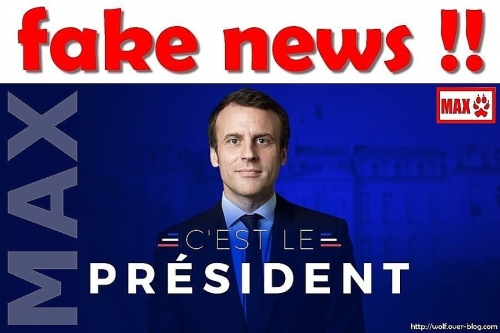
Une loi Macron contre les « fakes »?
par François-Bernard Huyghe
Ex: http://www.huyghe.fr
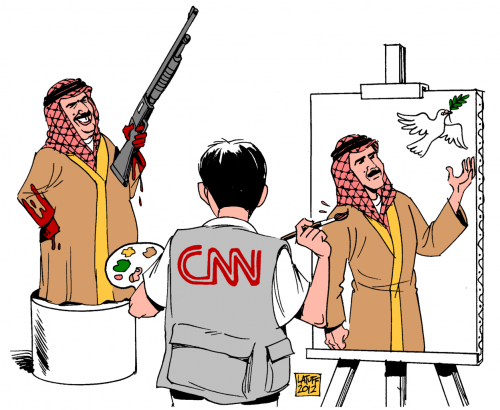

12:37 Publié dans Actualité, Affaires européennes | Lien permanent | Commentaires (0) | Tags : censure, police de la pensée, répression, totalitarisme, état policier, emmanuel macron, fake news, france, europe, affaires européennes, lois liberticides |  |
|  del.icio.us |
del.icio.us |  |
|  Digg |
Digg | ![]() Facebook
Facebook
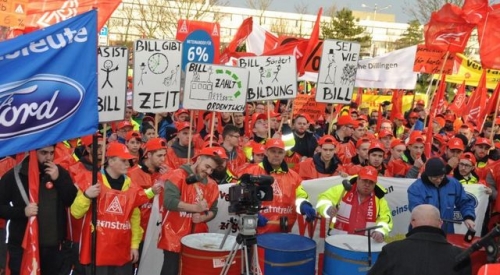
par Jean Paul Baquiast
Ex: http://www.europesolidaire.eu
Le patron de IG Metall, Jörg Hofman, a menacé de grèves plus étendues si l'industrie ne fait pas davantage de concessions. Le syndicat demande une hausse des salaires de 6% et plus généralement, le passage de la semaine de travail de 35 à 28 heures pour ceux qui le souhaitent, avec compensation partielle du manque à gagner salarial par l'employeur. La formule serait valable deux ans au maximum et l'employeur devrait garantir un retour à un poste à plein temps.
Il est surprenant de voir un tel mouvement de grève s'étendre dans un pays qui est devenu le leader européen en matière industrielle et dont de ce fait l'excédent à l'exportation bat des records, contrairement par exemple au déficit français qui ne cesse de s'accroitre.
On peut s'étonner en outre du fait que les syndicats s'engagent dans ce mouvement alors qu'ils soutiennent actuellement la formation d'un gouvernement de Grande Coalition (CDU, CSU et SPD). Il n'est pas certain que ce futur gouvernement, malgré la présence du SPD social démocrate, prête une oreille attentive aux revendications des travailleurs, alors qu'il sera nécessairement au service des intérêts industriels qui ont toujours financé la Grande Coalition.
Les grèves s'expliquent parce que les travailleurs allemands ont vu depuis des années s'accroitre les inégalités dont ils souffrent au regard de l'enrichissement des autres catégories sociales. Les revenus des allocataires ne cessent de diminuer, alors que s'accroissent les couts des dépenses médicales. Dans le même temps, les dividendes payés aux actionnaires se sont accrus dans le secteur industriel d'environ 10% depuis 3 ans (12% en 2016) alors que les salaires nominaux n'avaient cru que de 2 à 3 %, ce qui est ressenti comme un gel des salaires.
En dépit de l'actuelle semaine de 35h, environ 20% des salariés du secteur industriel travaillent, selon les syndicats, plus de 40 h, y compris pendant les jours de congé. Beaucoup d'entreprises ont été délocalisées en Europe de l'Est. Les salariés sont par ailleurs de plus en plus confrontés à la concurrence de travailleurs temporaires turcs ou fraichement immigrés.
IG Metall est bien obligé de tenir compte des revendications croissantes des travailleurs de la base. Ceux ressentent concrètement la disproportion croissante, même et surtout en Allemagne, entre le 1% des super-riches et les autres. L'avenir proche dira s'ils ont une chance de se faire entendre. L'expérience sera suivie sans doute attentivement par les autres salariés européens.
12:21 Publié dans Actualité, Affaires européennes | Lien permanent | Commentaires (0) | Tags : grèves, mouvements sociaux, allemagne, europe, affaires européennes, syndicalisme, syndicats |  |
|  del.icio.us |
del.icio.us |  |
|  Digg |
Digg | ![]() Facebook
Facebook